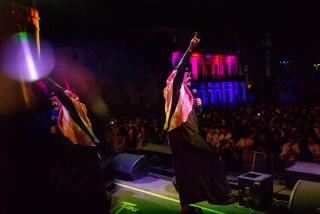A provocative voice of moderate Islam
- Share via
Reporting from Cairo — The mellifluous man in the sleek gray suit can make an Islamic radical wince in a nanosecond.
“Arabs had the opportunity to present Islam to the world but they failed in this age of oil,” said Khaled Gendy, a Muslim scholar and popular TV preacher broadcast across the Middle East.
“The Arab grew consumed with materialism and racism. He thinks Islam belongs only to the Arabs. He thinks the world is there only for him.”
Gendy paused and cleared his throat, his eyebrows rising over his blue-rimmed glasses: “The West is the victim of the Arabs, not the other way around. I want to fight these extremist Islamic tendencies.”
Not sentiments one often hears spread with such passion in this part of the world, but Gendy, an intellectual with a common touch and astute marketing instincts, is a provocative voice of moderate Islam. His newest venture is the expansion of the Arabic Azhari TV to include a channel with programs in English, French, Urdu and Pashto, allowing him to be heard from Paris to Kabul, Afghanistan. His next target: eastern Asia.
“The new masters of the universe will be Asians,” he said, sitting in the cool hum of a studio before one of his shows. “I am the future. The old preachers and clerics are the past. Preaching inside a mosque is not the only way anymore. The media is the password. We have to transfer religion into a way of life, not something to die for.”
The Islamic media are crowded with conflicting messages ranging from extremist rants to the appeal of hip holy men less concerned with brimstone than spiritual harmony.
But Gendy presents an intriguing dilemma for Egypt’s Al Azhar University, the leading center of Sunni Muslim thought worldwide. He is an Al Azhar graduate but the university has yet to officially endorse his TV channel, even as he recruits liberal faculty members for airtime in what has become a religious and ideological struggle within the institution.
The question for Al Azhar is how progressive to appear in a region where the mainstream must be carefully balanced with the conservative and the fundamentalist.
Gendy blends Islamic scripture with science, women’s rights, interdenominational relations and other modern themes that his Al Azhar critics say demean the Koran with liberal, even false, interpretations. Gendy, for his part, blames dogmatism for pushing away the rising educated middle-class and younger generations of Muslims.
The debate encompasses the role of the Egyptian government, which appoints Al Azhar’s grand sheik and influences institutional decisions, such as the recent banning of the niqab, or face veil, for female students. For now, the government approves of Gendy by giving him time on state-run TV and a post on Egypt’s Supreme Council for Islamic Affairs.
Despite their philosophical differences, Al Azhar and Gendy both serve the interests of the state by admonishing extremism, which the nation has sought to crush after terrorist bombings and attacks over the last 15 years.
One need only visit the offices at the university-affiliated Al Azhar Research Center to sense the divide between Gendy, who dispenses religious advice on a live call-in talk show, and the staid institution. The center’s director, Sheik Ali Abdul Baki, wearing a turban trimmed in maroon and sitting on gold-brocade furniture reminiscent of a past era, had no inclination to endear himself to the West or to what he regarded as preachers turning sacred texts into pop culture euphemisms.
“The West in all its might is trying to occupy the Middle East. They’ve set Islam as a target. The West wants to keep us down, but we can rebuild our Islamic renaissance,” said Baki. “But you have too many Islamic TV preachers talking on everything from everywhere. They need to be regulated. They’re distorting things, and this is not the right path to Islam. People are mixed up. Al Azhar is the true way to Islam.”
Critics say the university has been slow in engaging non-Muslims at a time of rapid globalization and misunderstanding of Islam in the West. In recent years, Al Azhar has encouraged students to study abroad and its professors, especially in the sciences, to attend international seminars. It cosponsored President Obama’s 2009 Cairo address to the Muslim world and is developing a curriculum that requires expertise in foreign languages and information technologies.
A big man with a round face and busy eyes, Gendy is represented by an international public relations firm. His public appeal spread in the 1990s when he went from teaching religious classes in mosques to a ubiquitous presence on websites and television. His first wife — he has been married several times — was a Coptic Christian who converted to Islam. Gendy makes frequent references to improving relations between religions and stopping sectarian violence.
He has even lauded Jews on his programs: “A Jew is worth a million Muslims,” he said, “because Jews did well to fully integrate into Western societies by not letting their religion stand in the way of their progress.”
Such opinions may one day reach more than 300 million homes in Europe, Asia and the Middle East.
Gendy stood and walked toward the lights. It was time for another show in a converted second-floor studio in an old mansion beside the Nile.
“We have received many threats. These radicals want to blow us up. They say we’ve gone too far,” said Gendy, who travels with no bodyguards or security precautions.
“The Islamic media doesn’t present Islam the way it should be. Muslims are not getting the correct message of Islam as peace.”
jeffrey.fleishman@latimes.com
Amro Hassan of The Times’ Cairo Bureau contributed to this report.
More to Read
Sign up for Essential California
The most important California stories and recommendations in your inbox every morning.
You may occasionally receive promotional content from the Los Angeles Times.














